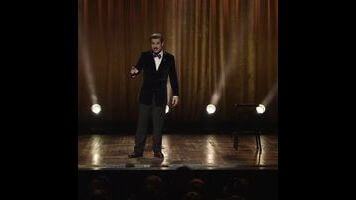In Crying And Driving, Paul F. Tompkins delivers another hilarious, deceptively personal standup special

“My name is Paul F. Tompkins and I do Paul F. Tompkins-based comedy.” Thus Paul F. Tompkins introduces himself at the beginning of his new standup special “Crying And Driving,” in which the ever-dapper Tompkins (sporting a black velvet jacket and violet bow tie for the evening) continues his hot streak of mining personal history for hilarious anecdotes, impeccably told. Always possessed of a nimble, original mind, Tompkins has, in turning his self-effacing, deeply sensible gaze inward, become one of the best comic storytellers around. As he did in 2012’s “Laboring Under Delusions” (one of the funniest, most assured standup specials in years), “Crying And Driving” sees Tompkins holding himself up as an example of how not to be a functional adult, an assertion seemingly belied by his ever-natty appearance and showbiz success, but feelingly reinforced by his perpetual bemusement at his own failings. (And those of others, naturally.)
“Laboring Under Delusions” saw Tompkins using his checkered employment history as signposts in what he sees as a lifelong journey of fakery and barely concealed failure. “Crying And Driving” isn’t framed with such a unifying theme, but it, too, sees Tompkins addressing his own inability to see himself as a real grownup, even as he acknowledges the ludicrous assumptions propping up both others’ perceived low opinions of him, and his own similar opinions of himself.
In deconstructing his father’s generation’s disdain for what he describes as his too-plentiful choices in life, Tompkins, in just a few lines, encapsulates how both points of view are simultaneously absolutely correct and thoroughly self-defeating and stupid. Tompkins has developed a comic voice that’s able to be both cutting and generous, that renders his parents’ summation of his emotional openness (“You think there’s something wrong with you? Ohh, I think there’s something wrong with you”) in deft comic brushstrokes. In interviews and in his comedy, Tompkins hints how his parents’ inability to support his career choices hurts him, especially now that they’re not around any more. (“Here’s how old that guy is—he’s dead,” he says of his dad.) When he brings that pain out into the open in talking about his recent experiences in therapy, he’s not hiding behind the jokes so much as acknowledging it as something universal, and therefore vulnerable to comic dismantling. (Making the case for analysis, Tompkins reassures the audience, “Now, it’s not all about blaming your parents for stuff—there’s enough of that, though, that you think that you’re getting your money’s worth.”)
That therapeutic experience is, in the signature Tompkins fashion of the special’s opening line, presented with implied apology for drawing attention to himself. When bringing up the topic, Tompkins adopts a warding-off stance and reassures the audience “Now I don’t want to talk about therapy any more than you wanna hear me talk about it,” a self-defense mechanism turned just as quickly against those who do, in fact, like nothing more than talking about their own problems. (“I don’t think your shrink is trying to get messages to me through you,” he responds to one such over-sharer, “Also, next time, listen a little closer, because you’re still a monster.”) A story about him having a breakdown in the alley behind comedy club Largo is illustrated with such precise detail (“Years of just stupid decisions and not knowing what to do—it’s like I am scream-weeping at the sidewalk. Like I am vomiting sadness out of my eyes”), and ends with a pair of narrative turns so unexpected and exquisitely delivered that the whole anecdote is a hilarious, truthful little masterpiece. There’s an especially potent emotional undercurrent here that’s all the more affecting because of how Tompkins never seems to reach for it—in his formalwear and his raconteur’s delivery, he’s the emcee of his own humiliations.
As ever, Tompkins is a masterful storyteller, his surgical deployment of the theatrical pause and ability to build a joke marked by an almost literary smoothness that, while clearly honed in the retelling, doesn’t sound rehearsed so much as it emerges through a process of inescapable but forgiving common sense. And while Tompkins’ style could be described as genial, it doesn’t keep him from delving into some painful stuff—heartbreak, depression, self-doubt, regret—all delivered as part of the special’s rolling, hilariously assured monologue. Tompkins’ facility with conceptual bits fits snugly into his more personal material, tonight seeing him embellish stories about, say, his wife’s South Carolina home town or his carefully-planned trip to have his long-delayed drivers’ license picture taken, with brilliantly loopy details, like a punchbowl filled with lightning, or an imagined DMV nighttime photo raid on his sleeping household. If there’s a criticism of the special, it’s that it feels short—but, as with “Laboring Under Delusions,” here’s hoping that an eventual DVD or CD release will include more time than Comedy Central could give to let the material breathe. (Tompkins’ stellar off-the-cuff riffing is especially notable in its absence.)
In stories here, Tompkins’ descriptions of various people—his second driving instructor, his wife, a guy who witnessed that crying jag in the alley, even the octogenarian subject of an awful oil painting at the world famous (and very silly) magicians’ enclave the Magic Castle—manage to convey how grateful he is for glimpses of common humanity in the face of common absurdity. It makes “Crying And Driving” as laugh-out-loud hilarious as it is unexpectedly touching.